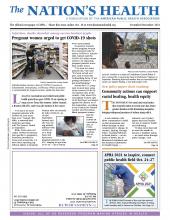Giving back has always been a priority for the All of Us Research Program. And in recent months, participants who had donated biological samples for research and opted to receive insights have begun getting results of their genetic tests — typically not an option for study participants.
The move not only allows people to learn important things about their health; it also helps them feel engaged and a valuable part of the All of Us work.
“Participants are our most important partners in this effort, and we know many of them are eager to get their genetic results and learn about the science they’re making possible,” Josh Denny, MD, the program’s chief executive officer, said in a news release.
Launched in 2018 by the National Institutes of Health, the All of Us Research Program is calling on Americans to voluntarily share their health data to advance science, with a goal of enrolling 1 million people.
All of Us researchers are performing in-depth genetic analyses that include both whole genome sequencing and genotyping, Sheri Schully, PhD, acting chief medical and scientific officer of the program, told The Nation’s Health.
Among the possibilities for research are determining how genetics affect chronic illnesses for diverse groups.
Because of the program’s informed consent process, participants can choose to receive their genetic results. Genetic counselors are available to help answer questions from participants and their health care providers.
The program has taken a phased approach to returning DNA results. In Phase 2, participants will have an opportunity to discover how genetics may affect their response to medicines, and how genetic variants might affect their risk for certain diseases.
All of Us has been collecting data during the COVID-19 pandemic through participant blood samples and surveys. The information can be used to learn more about the disease’s health and social impact, especially on minority and disadvantaged populations.
The ultimate goal of All of Us is to speed up research and improve health, in part by making timely data on a diverse range of people available to researchers. The program places a special emphasis on enrolling populations that are often left out of scientific research, such as people with disabilities, older adults and people of color. People from underrepresented groups account for about 80% of All of Us participants.
All of Us embraces precision medicine, which aims to treat individuals based on their unique diversity and medical history. It uses advances in genomics, state-of-the-art methods to manage and analyze large datasets, and health information technology to improve biomedical discoveries for all people. APHA is a partner in the program, providing information and helping recruit participants.
To learn more about All of Us and sign up, visit www.joinallofus.org.
- Copyright The Nation’s Health, American Public Health Association









